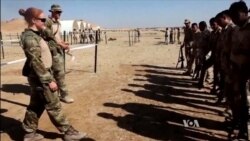ບັນດາສະມາຊິກສະພາສູງ ພັກຣີພັບບລິກັນ ໄດ້ສະແດງຄວາມ
ບໍ່ພໍໃຈກ່ຽວກັບ ຄວາມພະຍາຍາມຂອງສະຫະລັດ ທີ່ຈະສູ້ລົບ
ກັບພວກຫົວຮຸນແຮງລັດອິສລາມ ທີ່ຮູ້ກັນອີກຊື່ນຶ່ງວ່າ ISIL ນັ້ນ
ແລະໄດ້ສໍ້ຖາມລັດຖະມົນຕີປ້ອງກັນປະເທດທ່ານ Ash Carter
ແລະ ປະທານເສນາທິການຮ່ວມຂອງກອງທັບສະຫະລັດ ນາຍ
ພົນ Martin Dempsey ຢູ່ໃນການຮັບຟັງຄຳໃຫ້ການຕໍ່ຄະນະ
ກຳມະ ການກອງທັບຂອງສະພາສູງ ໃນວັນອັງຄານວານນີ້.
ສະມາຊິກສະພາສູງ Jonh McCain ປະທານຄະນະກຳມະການ
ໄດ້ສະແດງຄວາມບໍ່ພໍໃຈວ່າ ເປັນຄວາມ “ເພີ້ຝັນ” ທີ່ປະທານາທິ
ບໍດີ Barack Obama ໄດ້ກ່າວຍໍ້າເຖິງຍຸດທະສາດສະຫະລັດ ຢູ່ທີ່ທຳນຽບຫ້າແຈ ໃນວັນຈັນທີ່ຜ່ານມາ.
ທ່ານ McCain ກ່າວວ່າ “ພວກເຮົາບໍ່ໄດ້ັ້ຮັບໄຊຊະນະ. ແລະເວລາໃດທີ່ ທ່ານບໍ່ໄດ້ໄຊຊະ
ນະສົງຄາມ ທ່ານເສຍໄຊ. ກຸ່ມ ISIL ບໍ່ແມ່ນສູງເຖິງ 3 ແມັດ. ມັນສາມາດ ແລະຕ້ອງເອົາໄຊຊະນະໄດ້ ແຕ່ວ່າ ນັ້ນຈະບໍ່ເກີດຂື້ນ ຖ້າຫາກພວກເຮົາ ຍັງມີເພີ້ຝັນ ໃນຕົວເຮົາເອງ ກ່ຽວ
ກັບການສູ້ລົບຂອງເຮົາໃນປັດຈຸບັນ.”
ລັດຖະມົນຕີ ປ້ອງກັນປະເທດ ສະຫະລັດ ທ່ານ Carter ກ່າວວ່າ ອາເມຣິກາ ຈະປະເຊີນ
ໜ້າກັບກຸມ IS ແລະ “ເອົາຊະນະໃນທີ່ສຸດ” ຢູ່ໃນອີຣັກ ແລະຊີເຣຍ ຜ່ານຫລາຍແນວທາງ
ໃນຄວາມພະຍາຍາມ.”
ທ່ານ Carter ກ່າວວ່າ “ທຳອິດ ແລະເປັນທີ່ໂຕ້ຖຽງໄດ້ແນວທາງທີ່ສຳຄັນສຸດ ແມ່ນຄວາມພະຍາຍາມດ້ານການເມືອງ. ແນວທາງດັ່ງກ່າວນີ້ ພົວພັນກັບການ ເສີມສ້າງລັດຖະບານທີ່
ມີປະສິດທິຜົນຫລາຍຂື້ນ ປະກອບດ້ວຍຫລາຍຝ່າຍແລະ ທີ່ຫລາຍກຸ່ມສາສະໜາ ຢູ່ໃນ
ອີຣັກ. ໃນຂະນະດຽວກັນ ສະຫະລັດ ກໍຈະສືບຕໍ່ ດຳເນີນງານດ້ານການທູດ ເພື່ອໃຫ້ມີ
ການປ່ຽນແປງດ້ານການເມືອງ ຈາກທ່ານ Bashar al-Assad ໄປສູ່ລັດຖະບານ ທີ່ມີ
ຫລາຍພັກຝ່າຍ ໃນຊີເຣຍ ທີ່ເຮົາສາມາດດຳເນີນງານໄດ້ເຊັ່ນດຽວກັນ ເພື່ອເອົາ
ໄຊຊະນະກຸ່ມ ISIL ໄດ້.
ສະມາຊິກພັກຣີພັບບລິກັນຈຳນວນນຶ່ງ ໄດ້ຮຽກຮ້ອງມາເປັນເວລາດົນນານແລ້ວ ໃຫ້ສົ່ງ
ກຳລັງພິເສດຂອງສະຫະລັດ ໄປຊ່ວຍສູ້ລົບກັບພວກນັກລົບລັດອິສລາມ ທາງພາກພື້ນ
ດິນໃນອີຣັກ. ທ່ານ McCain ໄດ້ຕິຕຽນປະທານາທິບໍດີ Obama ໃນການບໍ່ເຫັນດີໃຫ້
ສົ່ງກຳລັງພາກພື້ນດິນໄປສູ້ລົບ.
Republican senators vented frustrations over U.S. efforts to fight Islamic State radicals, also known as ISIL, and grilled Secretary of Defense Ash Carter and the Chairman of the Joint Chiefs of Staff, General Martin Dempsey, at an Armed Services Committee hearing Tuesday.
Senator John McCain, the committee's chairman, blasted as "delusional" President Barack Obama's reiteration of U.S. strategy at the Pentagon Monday.
"We are not winning. And when you are not winning in war, you are losing," McCain said. "ISIL is not 10-feet [3 meters] tall. It can be and must be defeated; but, that will never happen if we continue to delude ourselves about our current campaign."
Secretary Carter said America will deal IS "a lasting defeat" in Iraq and Syria through multiple lines of effort.
"The first and arguably the most critical line of effort is the political one," Carter said. "This line involves building more effective, inclusive and multi-sectarian governance in Iraq. At the same time, the United States continues to work diplomatically to bring about a political transition from Bashar al-Assad to a more inclusive [Syrian] government with which we can also work to defeat ISIL."
Some Republicans have long urged the deployment of U.S. Special Forces to help battle Islamic State fighters on the ground in Iraq. McCain criticized President Obama for ruling out ground combat forces.
"The president is fond of the truism that there is no military solution to ISIL or any other problem," McCain said. "What he has so often failed to realize is that there is sometimes a major military dimension to achieving a political solution."
Another Republican, Jeff Sessions, said President Obama's 2008 campaign pledge not to embroil the United States in another ground war in the Middle East must yield to current day realities.
"At some point, the president is going to have to change his mind," Sessions said. "He cannot just function based on a campaign promise when reality is different."
In the past, General Dempsey told the committee he would not hesitate to recommend combat forces if and when the situation requires them. So far, he said, he has made no such recommendation to the president.
"Military power alone, as we have said, will not solve ISIL," Dempsey said. "Enduring stability cannot be imposed in the Middle East from the outside in. The fight is enabled by the coalition, but it must be owned by those regional stakeholders."
The general added that Special Forces "are not a silver bullet to the destruction of ISIL. The silver bullet is getting the Iraqis to fight."
To that end, President Obama has boosted U.S. personnel to train and equip Iraqi soldiers. Earlier this year, Carter questioned the mettle of Iraq's security forces, saying they lack "the will to fight." At Tuesday's hearing, the defense secretary acknowledged that an effort to train moderate Syrian fighters had fallen short of recruiting goals.
The committee's top Democrat, Senator Jack Reed, said the current debate cannot ignore the history of America's involvement in Iraq.
"Many of the factors and personalities forming ISIL can be traced to the [2003] invasion and occupation of Iraq.," Reed said. "Planning for that war failed to account for deep-seated sectarian divisions between Sunni and Shia within the region, which gave rise to grievances that fueled the rise of ISIL."
At the Pentagon Monday, President Obama noted that coalition forces have conducted more than 5,000 airstrikes against Islamic State positions. He predicted a long-term struggle with progress and setbacks.
"Ideologies are not defeated with guns. They are defeated with better ideas," Mr. Obama said. "This larger battle for hearts and minds is going to be a generational struggle. It is ultimately not going to be won or lost by the United States alone. It will be decided by the countries and the communities that terrorists like ISIL [Islamic State] target."
Tuesday, Senator McCain summed up his critique this way: "Our means and our current level of effort are not aligned with our ends."





